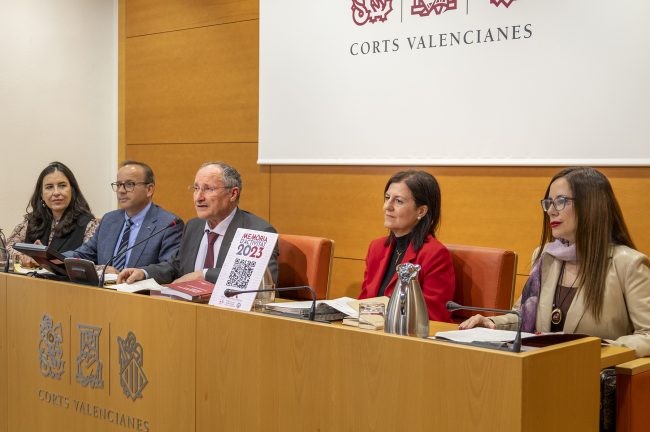València, March 26, 2024.- The Valencian Anti-Fraud Agency has delivered the Activity Report for the year 2023 that took place at the Saló dels Espills de les Corts Valencianes, thus complying with the mandate contained in article 22 of Law 11/2016 on the creation of the Agency.
The director of the Agency, Joan Llinares, has handed over the two volumes of the Report, one in Valencian and the other in Spanish, to the president of Les Corts, Llanos Massó. The event was also attended by the Ombudsmen of all the parliamentary groups and the Bureau of Les Corts.
The Report includes the activity carried out by the Agency during 2023 in the area of training, prevention and documentation; the legal and whistleblower protection area; analysis and research; Administration, Recruitment, and Human Resources and Communication.
Among the highlights of the 2023 Report is the international recognition of the work carried out by the Agency, which has been highlighted in the exchanges carried out with the European Anti-Fraud Office (OLAF) and the Italian National Anti-Corruption Authority (ANAC) and the visits received by the Anti-Corruption Office of Georgia or the National Anti-Corruption Centre of the Republic of Moldova. She was also invited by the European Commission’s group of experts to explain how its complaint box works.
In 2023, the Agency participated in meetings and encounters with the European Anti-Corruption Partners (EPAC) network; the European Network of Anti-Corruption Contact Points (EAPCN); the Network of European Integrity Authorities and Whistleblowers (NEIWA) and the Network of Corruption Prevention Authorities (NCPA).
The second outstanding aspect of 2023 has been its intense collaboration with the judicial bodies, which has materialized with the signing of a Collaboration Agreement with the Attorney General’s Office or the provision of training by the Agency’s staff to the 61st promotion of access to the prosecutorial career.
The collaboration has also materialized with the participation of the Agency as a judicial expert in 8 legal proceedings; the preparation of 5 reports of judicial assistance and the presentation and testimony in oral trial in 2 of the proceedings.
You can access the following links:
- Link to Executive Summary:
https://www.antifraucv.es/wp-content/uploads/2024/03/Resumen_ejecutivo_Memoria_AVAF_2023.pdf
- Link to the 2023 Activity Report:
https://www.antifraucv.es/wp-content/uploads/2024/03/MEMORIA_AVAF_2023_CAS.pdf









